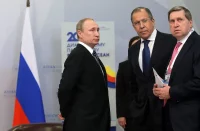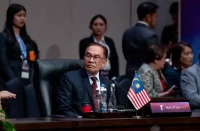Lawmakers from the “Union for the Homeland” (UxP) Party signed a collective letter to Argentine President Javier Milei demanding him to provide a comprehensive explanation for his decision not to join BRICS. The group of 15 deputies headed by Germán Martinez, president of the UxP bloc in the Chamber of Deputies of the Argentine Congress, said the decision will “damage the economies of Argentina’s regions by causing disputes with the country’s main economic partners”.
The group asked Milei’s government to provide a quantitative and qualitative report on the benefits that not joining BRICS will bring to the country, as well as economic, strategic, and cultural reasons that backed the decision in the first place.
What is more, the letter mentions in particular the question on whether the government considered the costs of not having access to international financing through the BRICS New Development Bank as well as the losses that the Argentine economy will suffer due to not taking part in multilateral cooperation in energy, technology, agriculture, food security, and artificial intelligence. “In a multipolar world being part of the system means joining the countries that are key for international development as well as our biggest partners”, said Santiago Cafiero, one of the signatories of the letter, adding that “the GDP of these countries is bigger than that of the G7”.
This comes against the background of Milei’s struggles to keep the economy afloat, as this week Argentina has become the country with the biggest inflation rate in the world, overcoming Lebanon, which occupied the top spot previously. A string of “shock therapy”-style reforms have put much strain the Argentine working class and caused massive protests around the nation with the next one of them scheduled for Wednesday – the same day that Congress will discuss Milei’s next mega-reform bill, which includes plans to privatize a number of state-owned enterprises to delegate a number of powers to the executive, to reform several environmental laws, and to include special permits for the government to take on debt.

According to a study by the University of San Andrés, Milei’s economic policies remain mostly without support of the general public, as only 38% of Argentinians agree with them. The economic situation in the country is going to become even worse in the coming months, which will put more strain on Milei’s government, as it continuously fails to deliver on its promises.
BRICS was originally a network alliance between Brazil, Russia, India, China, and South Africa. Six new members were welcomed in the bloc at the 2023 Johannesburg summit, including some of the most influential countries of the Global South, namely, Iran, Saudi Arabia, the United Arab Emirates, Egypt, Ethiopia and Argentina. Argentina’s entry was always going to be in doubt, as the country went into an election cycle at the end of the year. After winning the presidential election and assuming the presidency, Javier Milei decided to leave the bloc and announced the decision two days before Argentina’s membership was expected to take effect, saying that it was not an “opportune” moment for the country to join the bloc.
The decision was received respectfully by the governments of the BRICS member countries, although they sought to establish constructive cooperation with the extravagant President of Argentina. For instance, Russia’s President Vladimir Putin was one of the first ones in congratulating Milei on his electoral victory. Last week, the Kremlin spokesperson Dmitry Peskov said Russia respects Argentina’s sovereign decision not to join the BRICS bloc, but hopes that “in time the authorities of the country will consider it more beneficial to return to BRICS”.
Milei has publicly distanced himself from the states of the Global South and declared his desire to enhance relations with the United States and Western partners. This has been evidenced by Milei’s speech at the Davos World Economic Forum, which reverberated around the Western world. The video of the speech got 10 times more views on YouTube than speeches of other world leaders, such as Volodymyr Zelensky, Emmanuel Macron, Ursula von der Leyen, Pedro Sánchez, etc.
However, Milei’s domestic and foreign policies put Argentina at a risk of entering into a series of disputes not only with regional partners such as Brazil, but also with global superpowers like China. This will have a negative effect on the country as Argentina seeks to open up its economy to the outside world.














Comments